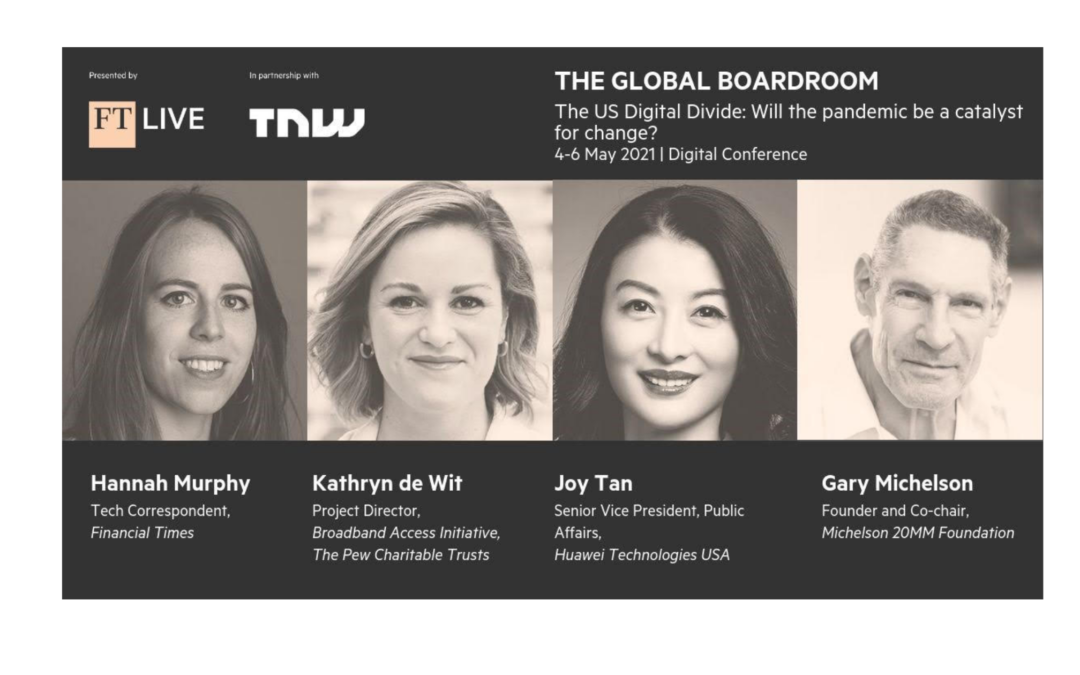COVID-19 revealed that reliable, high-speed internet access is essential for Americans to participate, enjoy, and thrive in modern society. Prior to the pandemic, many Americans were unaware just how badly the digital divide affected disadvantaged Americans, particularly people of color and those of little means. Now that the digital disparities have been brought to light, we must ask — will the pandemic be a catalyst for change? The panelists believe the answer is yes, so long as we continue to confront and remedy the systemic factors driving the inequity.
The persistent divide between those who have access to broadband internet, and those from low-income, rural, and tribal communities who often do not has been a focal area of work for the Michelson 20MM Foundation, which has made addressing this stark inequity a priority.
On May 5th, 2021, Dr. Gary K. Michelson, founder and co-Chair of Michelson 20MM, joined the Financial Times for a panel conversation that included Kathryn de Wit, Manager of the Broadband Research Initiative at the Pew Charitable Trusts, and Joy Tan, Senior Vice President of Public Affairs for Huawei Technologies USA. “The US Digital Divide: Will the pandemic be a catalyst for change?” touched on the challenges of accurate data collection, options for eliminating the divide, and what the future of digital equity may hold. The hour-long discussion highlighted two themes: 1. We still lack accurate data to solve the divide and 2. Innovation and fiber infrastructure will be crucial.
The United States Lacks Accurate Data on the Digital Divide
Numbers vary for how many Americans fall on the wrong side of the digital divide, making it all the more challenging to address the problem. The Federal Communications Commission estimates 21 million people are negatively impacted, while other figures place the true total at 42 million. “We don’t know the number of Americans who have a connection or don’t… we also don’t know the number of Americans who have access to a high-quality connection, who may have connections available, but can’t afford those connections,” Kathryn de Wit stated. “Those are really important questions for all of us to consider so that way we can scope policy solutions that address all of those issues.”
The Michelson 20MM Foundation commissioned a report by the Education Trust West that highlighted the equity implications of the digital divide for low-income students and students of color in higher education during the pandemic. This work resulted in the development of a digital map illustrating higher education’s response, including gaps in digital access and implementation of distance learning. Most recently we partnered with the USC Annenberg School for Communication and Journalism to expand their Connected Communities and Inclusive Growth project from LA County to the entirety of California. Through this work, our state will have a more granular analysis of broadband access and speeds. Furthermore, our partnership with the Public Policy Institute of California will leverage California-representative data to examine how the digital divide has changed from spring 2020–when schools first closed–to spring 2021. They’ll also present policy options to address lingering gaps with the recognition that digital learning is here to stay even after schools reopen.
Fiber, Competition, and Innovation are Critical to Addressing Digital Inequity
Despite the lack of robust data, we already know what is required to close the divide. “It’s going to take a range of solutions in order to solve this problem, but we do know that fiber will be a very important part of that solution,” said de Wit.
Joy Tan highlighted that increasing competition would help inspire connectivity innovation and may bring more affordable options to market.
“We just flew a helicopter in the thin atmosphere of Mars…we as a nation have the innovative capacity to solve this problem,” shared Dr. Michelson alongside a call for President Biden to issue a nationwide broadband technology innovation challenge to surface a solution that goes well beyond the current technology. He concluded, “We cannot see the future, but we certainly know it’s coming—why not do it now?
Michelson 20MM is a private, nonprofit foundation seeking to accelerate progress towards a more just world through grantmaking, operating programs, and impact investing. All activities are made possible thanks to the generous support of renowned spinal surgeon and inventor Dr. Gary K. Michelson and his wife, Alya Michelson.

